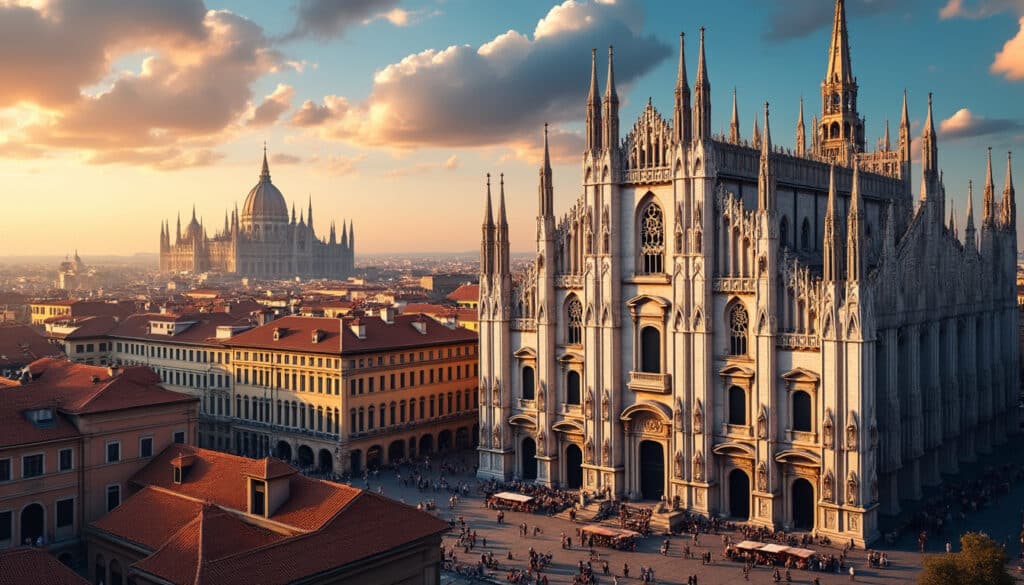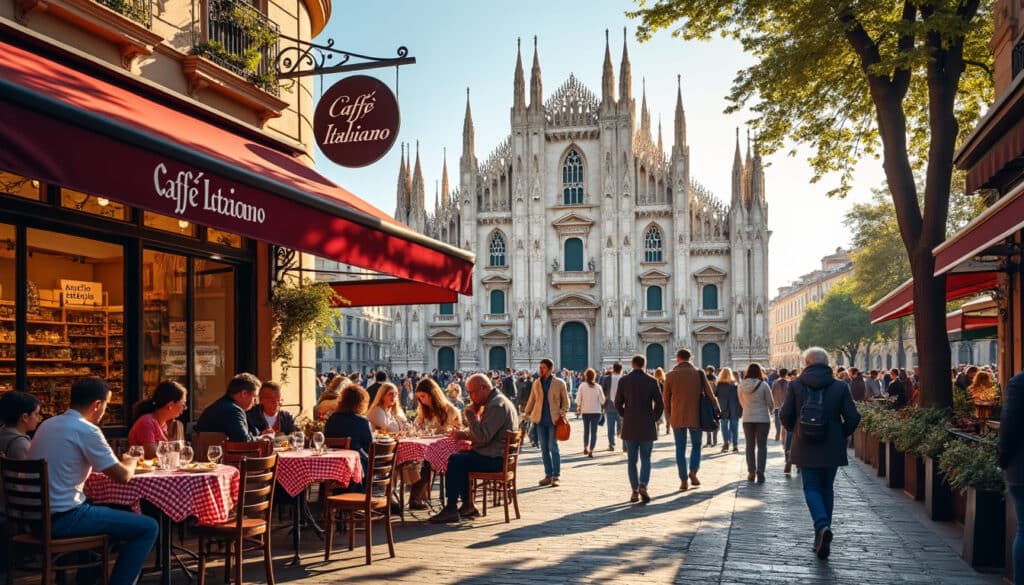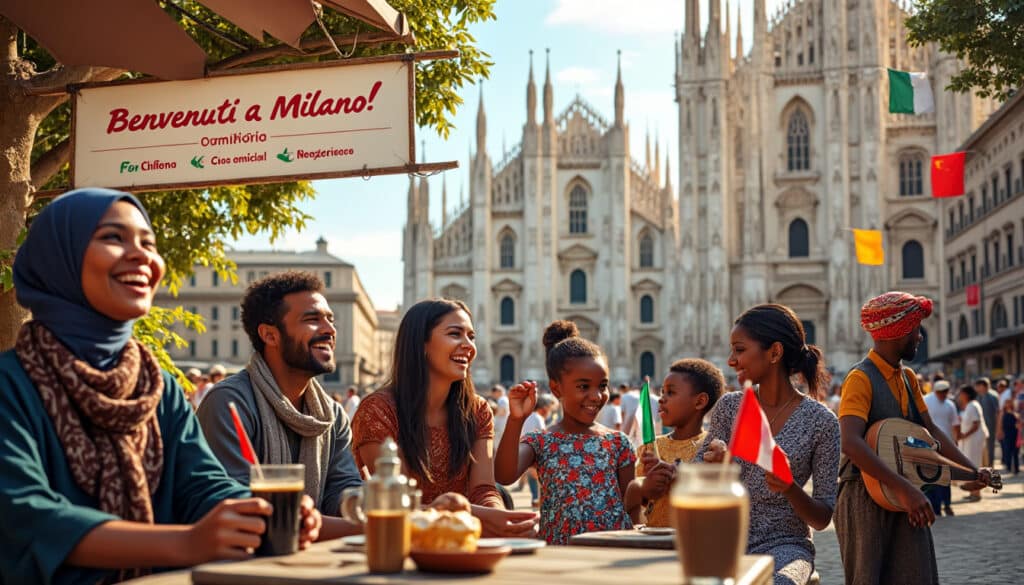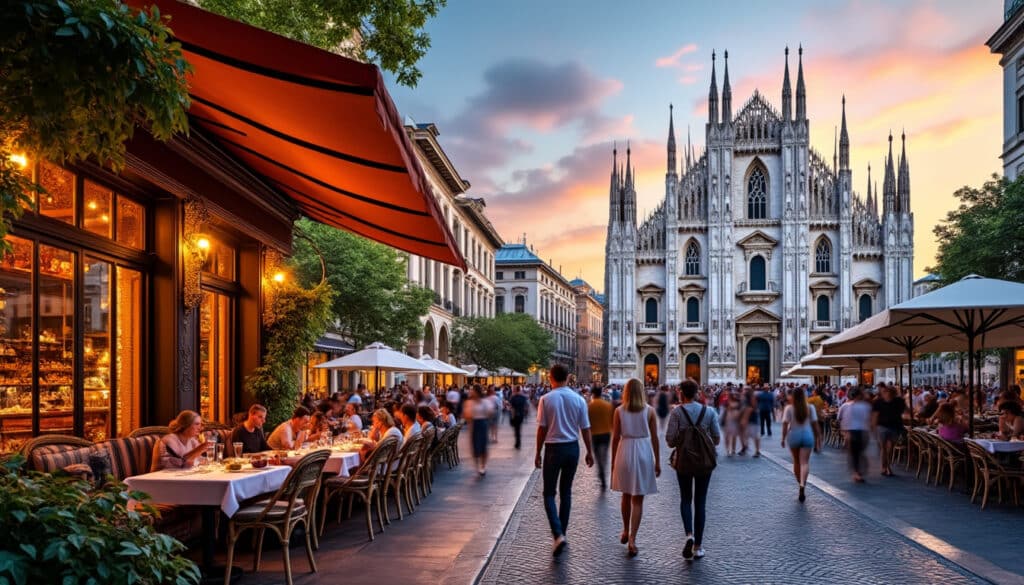Milan, a pulsating metropolis, is celebrated not only for its unparalleled fashion sense but also for its striking architectural tapestry that paints a vivid picture of its historical evolvement and modern aspirations. Known as Italy’s design Mecca, the city offers a captivating blend of ancient structures, modern landmarks, and innovative urban planning ideas that have spearheaded some of the most significant architectural transformations in Europe.
Gothic Grandeur: Milan’s Historical Heritage
Delve into the Gothic magnificence of Milan and you’ll be greeted by the iconic Duomo di Milano, a cathedral that has been a beacon of architectural achievement since its inception in the 1380s. This awe-inspiring cathedral stands as one of the most intricate Gothic structures in existence, embodying centuries of craftsmanship and religious devotion. Its construction spanned six centuries, culminating in an awe-inspiring façade adorned with statues that seem to soar towards the heavens.
The Duomo has become synonymous with Milan, acting as both a cultural and architectural focal point. The intricate carvings and exquisite stained glass windows narrate biblical tales and historical events. Visitors are often captivated by the rooftop terraces, offering a breathtaking view of Milan’s blend of ancient and modern skylines. Expect to be mesmerized by the spires that pierce the skyline like daggers of marble.

But the Duomo is not the only architectural marvel within Milan’s rich historical tapestry. The Sforza Castle is a red-bricked fortress that stands as a testament to the city’s medieval past. Housing a variety of museums and art collections, the castle conveys stories of past conquests and the strategic importance of Milan in military history. With its massive gates and defensive walls, it has long symbolized power and protection, embodying the resilience and strength of the city throughout various sieges and battles.
Furthermore, Milan’s dedication to preserving its historical heritage is evident in areas such as the Brera district. This artistic enclave hosts the famous Pinacoteca di Brera, home to a vast collection of Renaissance art. Strolling through its cobbled streets, one can encounter an array of traditional buildings boasting intricate facades and elegant design elements that underscore Milan’s dedication to artistry and cultural preservation.
Milan’s historical architecture thus depicts a city that balances its profound past with its vibrant present. The attention to detail and commitment to art and culture is meticulously preserved in these ancient edifices, serving as an inspiration for the city’s modern architectural endeavors.
Innovative Regeneration: Milan’s Modern Skyline
Fast forward to the present day, and Milan has undergone a remarkable architectural metamorphosis. The city’s modern skyline now boasts two major urban regeneration projects: Porta Nuova and CityLife. These areas stand as beacons of Milan’s ability to fuse the historical with the revolutionary in terms of architecture and urban planning.
Porta Nuova is a prime example of Milan’s modern architectural prowess. It features a striking array of high-rise buildings, including the renowned Unicredit Tower, which at 231 meters is Italy’s tallest building. Bosco Verticale, another highlight, presents an innovative concept attempting to integrate urban life with nature through its “vertical forest” structure. These twin residential towers are adorned with thousands of trees and plants, contributing not only to the city’s sustainability efforts but also enhancing its aesthetic appeal.
Similarly, the CityLife district is an emblem of 21st-century contemporary design. Designed by world-renowned architects such as Zaha Hadid, Arata Isozaki, and Daniel Libeskind, CityLife offers a futuristic urban experience with its mix of residential, commercial, and public spaces. The area’s genuine commitment to eco-sustainability is evident in its car-free zones and public parklands, demonstrating a forward-thinking approach to urban living.
Furthermore, institutions like Fondazione Prada contribute to Milan’s architectural allure with cutting-edge designs combined with cultural elements. This contemporary art space, housed in a former gin distillery, merges the past and present through its eclectic use of materials and spaces.
- 🌳 Bosco Verticale: Revolutionizes urban ecology
- 🏢 Unicredit Tower: Italy’s towering achievement
- 🏙️ CityLife: A testament to innovative urban planning
Milan Design Week, a staple in the city’s cultural calendar, further underscores Milan’s prominence as a design hub. It attracts creators and enthusiasts from around the globe, infusing the city with fresh perspectives and striving to push boundaries in both architecture and urban landscape design.
The Influence of Milanese Architectural Titans
Milan’s architectural landscape bears the imprint of illustrious architects whose designs shaped the city during tumultuous times. Giuseppe Terragni, Gio Ponti, and Aldo Rossi are but a few of the influential figures who left an indelible mark on Milan’s skyline during the 20th century. Their works defined a distinct ‘Style Milano’, characterized by clean lines, functional design, and a unique blend of old and new.
The 1950s marked a transformative period with architects venturing into what can be described as a modern renaissance, driven by collaborations between designers, builders, and producers. This era saw the rise of private residential sectors and public buildings that introduced novel architectural ideologies, provided a platform for both technological advancements, and maintained figurative values represented through timeless facade designs. The engagement with materials such as aluminum and glass became central to evoking modernism.
The Pirelli Tower, completed in 1958, is a paragon of this era conceived by architect Gio Ponti. The tower became a symbol of Milan’s post-war economic surge and reflects the fusion of technical advancement and aesthetic refinement.
In the present day, institutes such as the Triennale di Milano curate and showcase cutting-edge architectural designs, acting as forums for intellectual exchange and cultural dialogue. Here, established and emerging architects come together, ignite ideas, and foster innovations that transcend traditional paradigms.
- ✏️ Giuseppe Terragni: Pioneer of Italian rationalism
- 🏢 Pirelli Tower: A shining example of post-war modernism
- 💡 Triennale di Milano: A breeding ground for the future of design
These architectural titans continue to inspire future generations, and their principles remain embedded in Milan’s evolving cityscape, reaffirming the city’s status as a design powerhouse.
Urban Planning and Sustainable Innovations in Milan
Beyond the aesthetic allure, Milan’s urban planning exemplifies integration with practicability and sustainability—a challenge embraced with fervor in the city’s architectural advancements. With rapid urbanization, Milan positions itself as a model of sustainable urban development on the world stage.
Innovations such as green roofs and energy-efficient buildings characterize modern initiatives, with plans to expand pedestrian-friendly zones and enhance public transportation networks. Milan’s commitment aligns with broader goals to reduce ecological footprints and improve the quality of urban life.
Prominent projects like the Blu Line, a comprehensive metropolitan railway expansion launched during the 2015 World Expo, highlights Milan’s foresight in infrastructure development and connectivity.
Urban initiatives are constantly evolving through collaborations with some of the world’s leading designers, ensuring harmony between the city’s heritage and its progressive aspirations. Public spaces have been reimagined to facilitate community interaction, further fostering an inclusive urban atmosphere.
| Feature | Details |
|---|---|
| 📉 Reduced Emissions | Green building practices |
| 🚶 Pedestrian Zones | Car-free areas in CityLife |
| 🚆 Public Transport | Efficient metro and rail expansions |
The plaque of sustainable architectural practices is firmly affixed in Milan’s framework, ensuring that the city remains a vibrant and habitable environment for years to come.
Cultural and Architectural Landmarks
Milan’s cultural heritage constitutes a rich mosaic where art, architecture, and everyday living converge. The city’s architectural features are not isolated; they are woven seamlessly into the urban fabric, enhancing the vibrancy and cultural richness that Milan is renowned for.
Casa Milan, housing the headquarters of AC Milan, serves as both a cultural and architectural landmark. Its striking design features symbolize the dynamic spirit of both the club and the city. Another exemplary model is the Bulgari Hotel, a luxury establishment that mirrors lavish living combined with innovative design elements.
The integration of global brands such as Armani and Olivetti in Milan’s architectural lexicon represents the intersection between commercial prowess and aesthetic expression. Whether it’s high fashion, luxury, or technology, Milan has seamlessly integrated these elements into its architectural narrative.
Moreover, spots like KFC Espress illustrate the impact of commercial architecture and how it adapts to Milan’s urban landscape without compromising the city’s authenticity. Milan’s commitment to its cultural roots while embracing modernity is evident in carefully curated spaces like the Bagatti Valsecchi Museum and its titled opulence stored within historical settings.
- 🏛️ Casa Milan: A hub for football aficionados
- 🏨 Bulgari Hotel: Where luxury meets design
- 🏬 Olivetti: Bridging technology with tradition
These landmarks are not only essential pieces of Milan’s cultural and architectural spirit but also act as platforms for storytelling, blending the old tales of Italy with its progressive pulse.
FAQ: Unlocking Milan’s Architectural Secrets
- What is the most iconic architectural feature in Milan? The Duomo di Milano stands as the city’s most iconic feature, showcasing Gothic art and architecture that represents centuries of Milanese culture.
- Which modern projects highlight Milan’s architectural innovation? Porta Nuova and CityLife are standout modern projects, featuring high-rise buildings, eco-friendly designs, and reimagined urban spaces.
- How does Milan integrate sustainability in its urban planning? Milan incorporates sustainability through developing green roofs, expanding pedestrian zones, and enhancing public transportation systems.

Fun Facts & Curiosities About Milan
Milan, often recognized as a global beacon of style, combines its fashion-forward reputation with a deep-rooted cultural and historical tapestry. From its majestic Gothic cathedral to the vibrant hustle of Milan Fashion Week, the city is aflame with stories waiting…

Milan, a gem in the heart of northern Italy, offers a tapestry of history, culture, and modernity that captivates all who visit. Known as Italy’s economic powerhouse, Milan effortlessly melds the old with the new. It’s a city where ancient…

Demographics and geography of Milan
Milan, a bustling metropolis located in northern Italy, is not just renowned for its rich cultural heritage and fashion prestige but also for its demographic and geographic complexity. Home to some of the world’s most iconic brands such as Gucci,…

Milan, in the heart of Northern Italy, has a history as rich and dynamic as its reputation as a global center for fashion and design. From its ancient beginnings to its renaissance glory, Milan has been a pivotal player in…

Holidays and celebrations in Milan
The vibrant city of Milan, known as Italy’s fashion and cultural hub, offers a delightful array of holidays and celebrations that reflect its rich history and modern allure. From the festive atmosphere of Milanese Holidays to the charm of Italian…

Language and spelling of Milan
Milan, a bustling metropolis located in northern Italy, is not only famous for its fashion and design shows, such as the renowned Milan Fashion Week and the acclaimed Milan Furniture Fair, but it also boasts a rich tapestry of languages…

Local tips for tourists in Milan
Milan, often celebrated as the financial and fashion heartbeat of Italy, beckons travelers with its blend of historic intrigue and contemporary flair. As the sun rises over the city’s rooftops, it casts a golden glow on architectural icons like the…

Names, flags, and identity of Milan
Milan, a city renowned for its significant economic influence, captivating cultural history, and pioneering fashion industry, is replete with rich symbols and emblems that define its identity. From its origins as Mediolanum to its modern reputation as a global fashion…

Reputation and identity of Milan
📍 Milan, the beating heart of fashion and design, has long been celebrated for its unique blend of history, culture, and modernity. As a global hub of innovation, it seamlessly marries its ancient past with its cutting-edge present, creating a…

Milan, a buzzing epicenter of fashion, culture, and history, holds a unique position in the globe not only for its iconic landmarks and vogue narratives but also for its specific place within the world’s time zones. When planning a trip…

Unusual facts and social issues in Milan
Milan, a bustling metropolis in the heart of Italy, is renowned for its chic fashion scene, rich historical tapestry, and unique cultural quirks. From Leonardo da Vinci’s incredible legacy to the iconic Milan Fashion Week, the city offers an array…

What does Milan look, smell, feel like?
Milan, a city of irresistible charm, stands on the cusp of modernity and tradition, casting a spell on anyone who dares to wander through its captivating streets. Known globally as the fashion capital, Milan is much more than its runways.…


